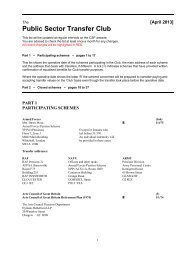Job Evaluation Good Practice Guide - The Civil Service
Job Evaluation Good Practice Guide - The Civil Service
Job Evaluation Good Practice Guide - The Civil Service
You also want an ePaper? Increase the reach of your titles
YUMPU automatically turns print PDFs into web optimized ePapers that Google loves.
INTRODUCTIONPurpose of the <strong>Guide</strong>This guide is intended to raise awareness of good practice in the applicationand maintenance of the <strong>Job</strong> <strong>Evaluation</strong> and Grading Support (JEGS) system.For JEGS practitioners, it should be used as a supplement to the JEGShandbook - but it is also intended for use by anyone else involved with theJEGS process.Central Responsibility and Support for JEGS<strong>The</strong> Cabinet Office is responsible for the integrity of JEGS. This responsibilityincludes: the maintenance and development of the JEGS methodology inconsultation with Towers Perrin (who own the copyright to the software);oversight of training standards through a framework agreement held with atraining provider; approving organisations’ amendments to the JEGShandbook; and giving strategic advice to users on standards of applicationand good practice in JEGS and job evaluation generally. For furtherinformation and guidance please contact:-Stephen King or Beverley PyeCabinet Office<strong>Civil</strong> <strong>Service</strong> Capability GroupRoom 2. 6Admiralty Arch<strong>The</strong> MallLondon SW1A 2WHTel. 020-7276-2230 or 020-7276-1783<strong>The</strong> Role of <strong>Job</strong> <strong>Evaluation</strong><strong>The</strong> aim of job evaluation is to provide a systematic, fair and consistent meansof measuring the relative value of jobs in an organisation. <strong>Job</strong> evaluationmeasures jobs not job holders. It does not measure performance, loading (i.e.the volume of work), or determine pay.Discrimination<strong>The</strong> main threat to achieving fairness and consistency in job evaluation isdiscrimination. Great care must be paid to ensure that measurements do nothave an impact on one group at the expense of another. This is particularlyimportant where anti-discrimination legislation applies regarding gender, race,sexual orientation, age and disability and, in Northern Ireland, politicalaffiliation or religion. Equal Pay Legislation has direct references to the use ofjob evaluation - a summary is given in Annex 1.1

















